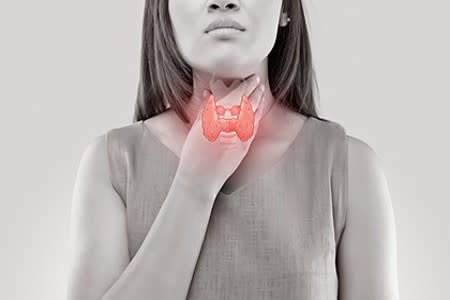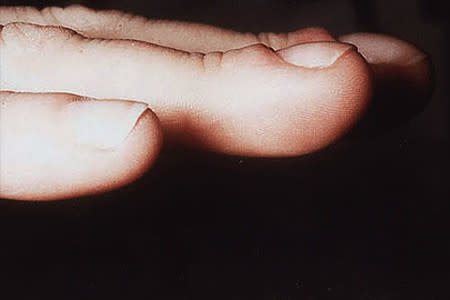Thyroid disease: A checklist of skin, hair, and nail changes
Although your thyroid gland sits deep in your neck, your dermatologist may be the first doctor to notice signs of thyroid disease. That’s because many signs and symptoms of thyroid disease develop on the skin, hair, and nails.
The thyroid gland
The thyroid is a butterfly-shaped gland in your neck that produces hormones, which play a key role in regulating your heartbeat, breathing, and many other functions.

You, too, may also be able to spot thyroid disease, and that’s important. Caught early, treatment can prevent complications. When thyroid disease goes untreated for years, it can lead to a dangerously slow (or fast) heartbeat, an injury that refuses to heal, or unrelenting pain. You may have gained or lost weight for no apparent reason.
To help you find early (and some not-so-early) signs of thyroid disease on your skin, hair, and nails, here’s a checklist.
How many of these signs and symptoms do you have?
Skin
☐ Dry, pale, and cool skin
Protruding eyes
When eyes protrude, it’s often a sign of thyroid disease.

Painless lumps and patches of scaly skin feel hard and waxy
Lumps on discolored skin that feel hard and waxy can be a sign of thyroid disease.

Hair
☐ Thinning (or missing) eyebrows on the outer edge
Nails
☐ Thick, dry, and brittle with visible ridges
Curved nails with swollen fingertip
A swollen fingertip, curved nail, and thickening skin above a nail are often signs of thyroid disease.

Itch
☐ Itchy skin without a rash
Existing skin disease
You have a higher risk of developing thyroid disease if you have one of the following:
☐ Vitiligo
When to contact your doctor
If you’ve checked off signs and are not feeling yourself, discuss this with your primary care doctor. These signs don’t necessarily mean that you have thyroid disease. By asking you about your symptoms, your doctor can decide whether you need a blood test to check for thyroid disease.
Have a skin, hair, or nail problem?
No one understands your skin better than a board-certified dermatologist. Partner with the expert for the best care.
Images
Images 2, 3, 4: Used with permission of the Journal of the American Academy of Dermatology: J Am Acad Dermatol. 2003 Jun;48(6):970-2.
References
Anderson CK, Miller OF. “Triad of exophthalmos, pretibial myxedema, and acropachy in a patient with Graves' disease.” J Am Acad Dermatol. 2003;48(6):970-2.
Bae JM, Lee JH, et al. “Vitiligo and overt thyroid diseases: A nationwide population-based study in Korea.” J Am Acad Dermatol. 2017;76(5):871-8.
Callen JP. “Dermatologic manifestations in patients with systemic disease.” In: Bolognia JL, et al. Dermatology. (second edition). Mosby Elsevier, Spain, 2008: 681-2.
Kalus AA, Chien AJ, et al. “Diabetes mellitus and other endocrine diseases.” In Wolff K et al. Fitzpatrick’s Dermatology in General Medicine (seventh edition).” McGraw Hill, China, 2008:1470-4.
 Atopic dermatitis: More FDA-approved treatments
Atopic dermatitis: More FDA-approved treatments
 Biosimilars: 14 FAQs
Biosimilars: 14 FAQs
 How to trim your nails
How to trim your nails
 Relieve uncontrollably itchy skin
Relieve uncontrollably itchy skin
 Fade dark spots
Fade dark spots
 Untreatable razor bumps or acne?
Untreatable razor bumps or acne?
 Tattoo removal
Tattoo removal
 Scar treatment
Scar treatment
 Free materials to help raise skin cancer awareness
Free materials to help raise skin cancer awareness
 Dermatologist-approved lesson plans, activities you can use
Dermatologist-approved lesson plans, activities you can use
 Find a Dermatologist
Find a Dermatologist
 What is a dermatologist?
What is a dermatologist?
